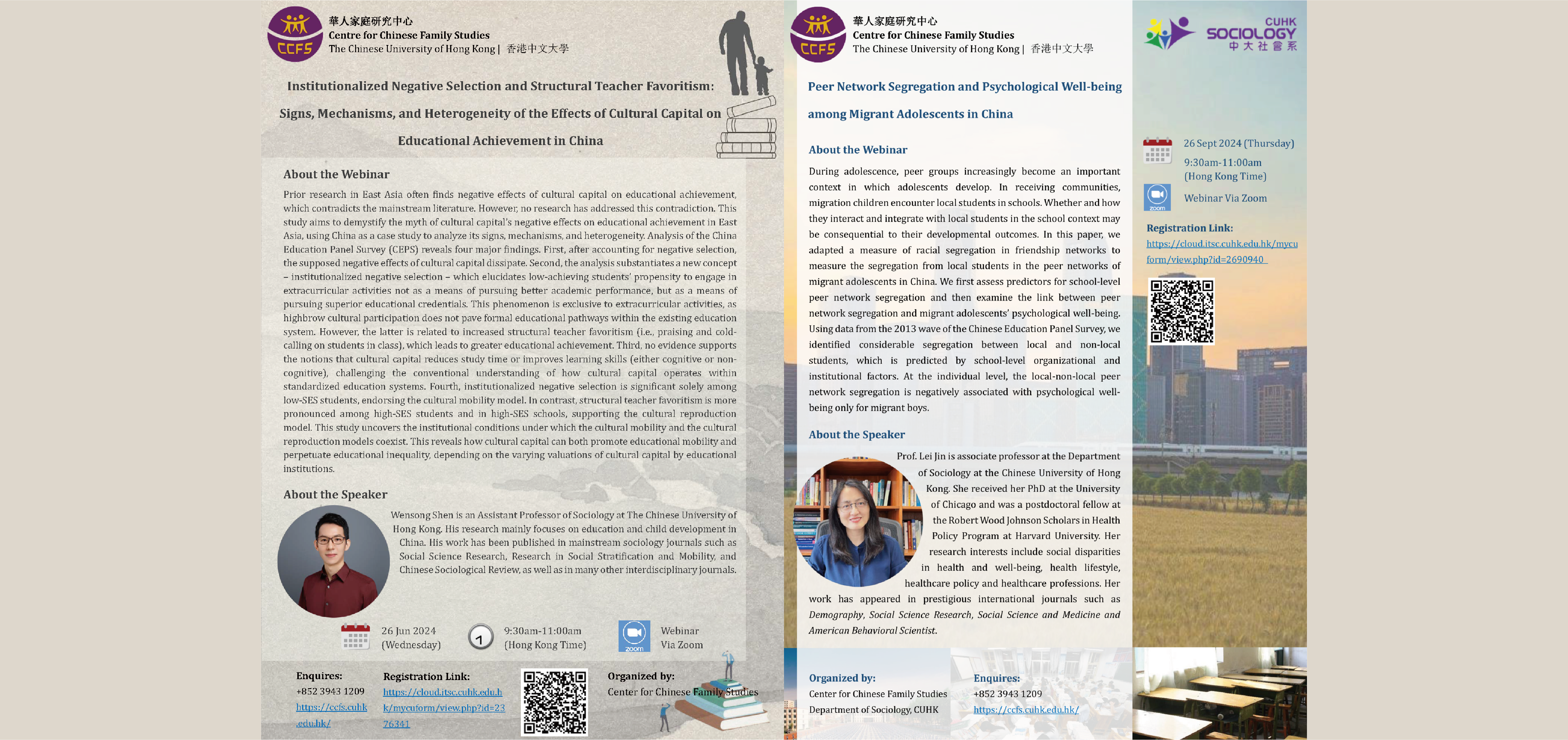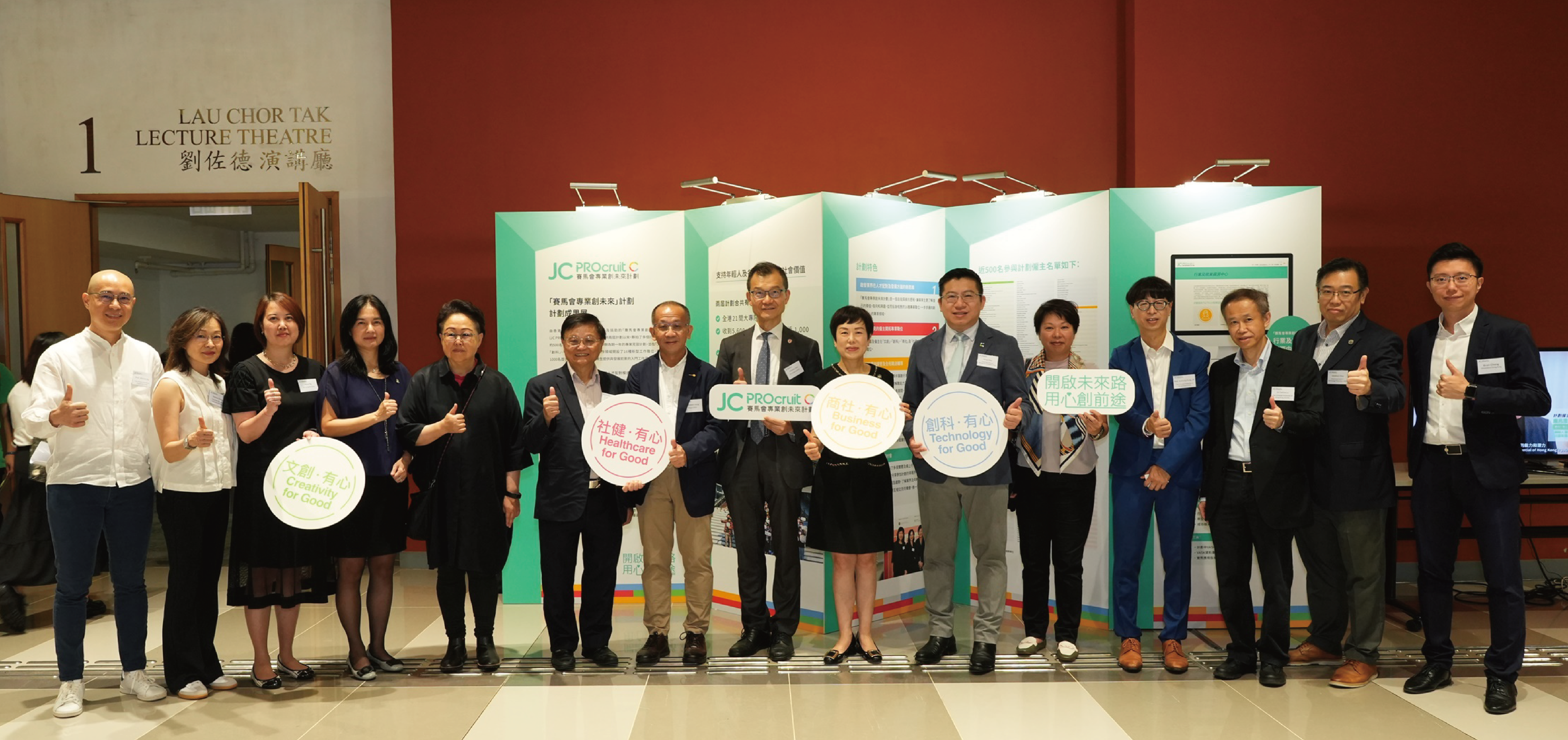
|
| Seminars and Others |
|
|
| Centre for Chinese Family Studies |
Centre for Social Innovation Studies |
Centre for Urban Innovations | Centre for Youth Studies |
| Research Centre for Urban and Regional Development | Chinese Law Programme |
|
Speaker
Dr Wensong Shen |
Assistant Professor, Department of Sociology, CUHK
|
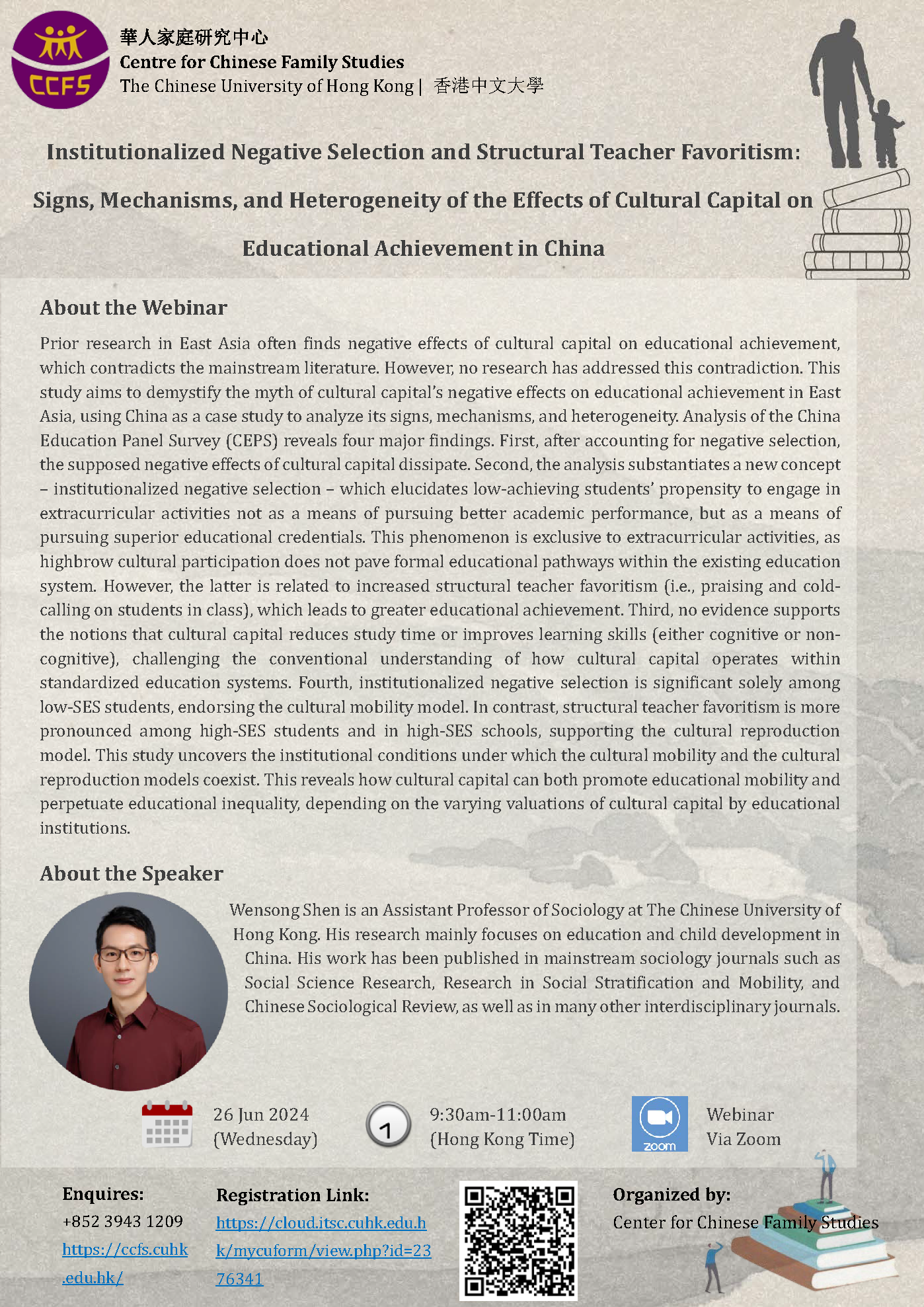 Prior research conducted in East Asia has often found that cultural capital has negative effects on educational achievement,
which contradicts the mainstream literature.
However, no studies have addressed this contradiction.
This webinar aims to demystify the myth of cultural capital’s negative effects on educational achievement in East Asia,
using China as a case study to analyse its signs, mechanisms, and heterogeneity.
An analysis of the China Education Panel Survey (CEPS) reveals four major findings.
Prior research conducted in East Asia has often found that cultural capital has negative effects on educational achievement,
which contradicts the mainstream literature.
However, no studies have addressed this contradiction.
This webinar aims to demystify the myth of cultural capital’s negative effects on educational achievement in East Asia,
using China as a case study to analyse its signs, mechanisms, and heterogeneity.
An analysis of the China Education Panel Survey (CEPS) reveals four major findings.First, after accounting for negative selection, the supposed negative effects of cultural capital dissipate. Second, the analysis substantiates a new concept – institutionalized negative selection – which elucidates the propensity of low-achieving students to engage in extracurricular activities not as a means of pursuing better academic performance, but as a means of pursuing superior educational credentials. This phenomenon is exclusive to extracurricular activities, as highbrow cultural participation does not pave formal educational pathways within the existing education system. However, the latter is related to increased structural teacher favouritism (i.e., praising and cold-calling on students in class), which leads to greater educational achievement. Third, no evidence supports the notion that cultural capital reduces study time or improves learning skills (either cognitive or non-cognitive), challenging the conventional understanding of how cultural capital operates within standardized education systems. Fourth, institutionalized negative selection is significant solely among low-SES students, endorsing the cultural mobility model. By contrast, structural teacher favouritism is more pronounced among high-SES students and in high-SES schools, supporting the cultural reproduction model. This webinar uncovers the institutional conditions under which the cultural mobility and the cultural reproduction models coexist. It reveals how cultural capital can both promote educational mobility and perpetuate educational inequality, depending on the varying valuations of cultural capital by educational institutions. |
|
|
Peer Network Segregation and Psychological Well-being among Migrant Adolescents in China
09:30–11:00 | 26 September 2024 | Online |
|
|
Speaker
Prof. Lei Jin |
Associate Professor, Department of Sociology, CUHK |
|
Co-organizer
Department of Sociology, CUHK |
|
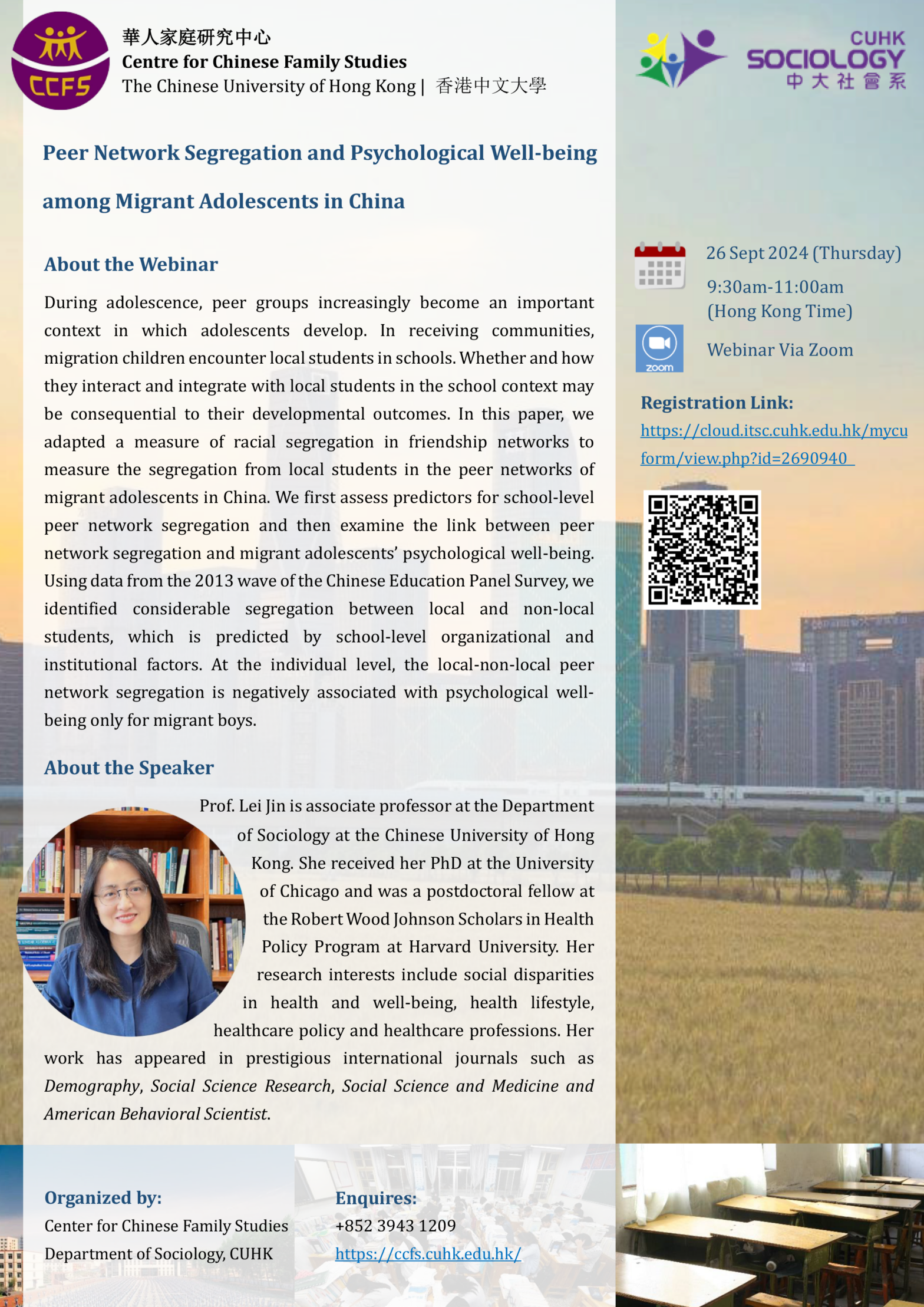 During adolescence, peer groups increasingly become an important context in which adolescents develop.
In receiving communities, migrant children encounter local students in schools.
Whether and how they interact and integrate with local students in the context of school may be consequential to their developmental outcomes.
During adolescence, peer groups increasingly become an important context in which adolescents develop.
In receiving communities, migrant children encounter local students in schools.
Whether and how they interact and integrate with local students in the context of school may be consequential to their developmental outcomes. In this webinar, Prof. Lei Jin and her team adapted a measure of racial segregation in friendship networks to measure the segregation from local students in the peer networks of migrant adolescents in China. Prof. Jin first assessed predictors of school-level peer network segregation and then examined the link between peer network segregation and the psychological well-being of migrant adolescents. Using data from the 2013 wave of the Chinese Education Panel Survey, Prof. Jin identified a considerable degree of segregation between local and non-local students, which was predicted by school-level organizational and institutional factors. At the individual level, local-non-local peer network segregation was negatively associated with psychological well-being only for migrant boys. |
|
|
Centre for Social Innovation Studies
BEST with LESS Hong Kong Tertiary Sustainable Packaging (F&B Industry) Design Competition Exhibition (CUHK) 25 September–16 October 2024 | G/F, Esther Lee Building, CUHK |
|
|
Co-organizer
CUHK Jockey Club Museum of Climate Change |
|
|
Sponsors
Environment and Conservation Fund, HKSAR Government HKIAPS |
|
 The Centre for Social Innovation Studies (CSIS) has been an active advocate of environmental education that integrates humanities and the arts to foster cross-sectoral behavioural change.
This year marks a significant milestone for the CSIS as it embarks on its inaugural collaboration with Maxim’s Group,
a leading catering enterprise in Hong Kong.
Together with renowned designers, eco-material manufacturers, and other stakeholders,
they launched the “BEST with LESS Hong Kong Tertiary Institutions Sustainable Packaging (F&B Industry) Design Competition”.
The Centre for Social Innovation Studies (CSIS) has been an active advocate of environmental education that integrates humanities and the arts to foster cross-sectoral behavioural change.
This year marks a significant milestone for the CSIS as it embarks on its inaugural collaboration with Maxim’s Group,
a leading catering enterprise in Hong Kong.
Together with renowned designers, eco-material manufacturers, and other stakeholders,
they launched the “BEST with LESS Hong Kong Tertiary Institutions Sustainable Packaging (F&B Industry) Design Competition”.The competition showcases innovative designs aimed at promoting sustainability in the food and beverage packaging industry. The eight shortlisted designs from the first round of judging were exhibited at Shatin New Town Plaza on 21–24 September. The results of the competition were announced during the award ceremony on 22 September, which was attended by guests including Mr Chin-wan Tse, Secretary for Environment and Ecology, Mr Keith Siu, Chief Operating Officer (Hong Kong and Macau) of Maxim’s Group, and over a hundred professionals from academia, the design industry, and the environmental sector. With the support and sponsorship of the HKIAPS and the Social Responsibility and Sustainable Development Office, the design works are currently on display at the ground floor of the Esther Lee Building at CUHK, and will be showcased at various tertiary institutions in the coming months. |
|
|
Speakers
Prof. Mee Kam Ng |
Associate Director, HKIAPS, CUHK |
|
Miss Ching-yeung Li
|
Research Assistant, HKIAPS, CUHK |
|
Co-organizer
Urban Studies Programme, CUHK |
|
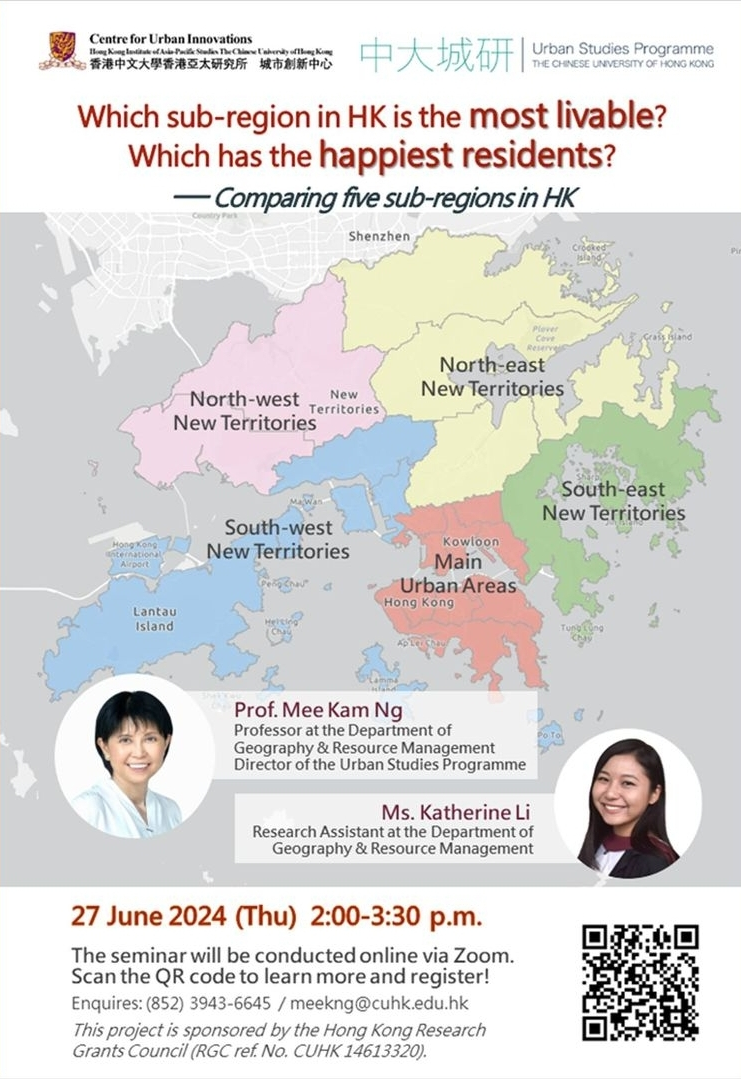 Funded by the Hong Kong Research Grants Council,
this webinar presented the outcomes of a study on the impact of the “Hong Kong Planning Standards and Guidelines” on the city’s built environment and people’s sense of place and subjective well-being.
Funded by the Hong Kong Research Grants Council,
this webinar presented the outcomes of a study on the impact of the “Hong Kong Planning Standards and Guidelines” on the city’s built environment and people’s sense of place and subjective well-being. In the study, Hong Kong was divided into five sub-regions, namely the main urban areas, the north-east New Territories, the north-west New Territories, the south-east New Territories, and the south-west New Territories. A total of 2,002 Hong Kong citizens from all sub-regions were interviewed in late 2023 using a questionnaire. The questionnaire investigated the respondents’ overall satisfaction with their residence, neighbourhood environment, transport facilities, pedestrian environment, retail and service facilities, open space and recreational facilities, and community facilities. It also examined the respondents’ sense of place and subjective well-being, thereby reflecting on the impact of Hong Kong’s population density and urban planning on the well-being of its citizens. |
|
|
「活農活現 」:香港農地議題研討會 2024
14:00–17:45 | 3 August 2024 | LT5, Yasumoto International Academic Park, CUHK |
|
|
Speakers
Mr Tsz-Lam Yip |
Manager, Regenerative Agriculture Department, Kadoorie Farm and Botanic Garden |
|
Prof. Kin-Che Lam
|
Adjunct Professor,
Department of Geography and Resource Management, CUHK |
|
Mr Kim-ching Chan
|
Researcher, Liber Research Community
|
|
Mr Tommy K. C. Cheung
|
Project Manager, Hong Kong Bird Watching Society
|
|
Mr Cheuk-hang Ng
|
Sun Hing Farm
|
|
Mr Tsz-wai Loon
|
Chief Executive, Land Education Foundation
|
|
Prof. Mee Kam Ng
|
Associate Director, HKIAPS, CUHK
|
|
Moderators
Prof. Mee Kam Ng |
Associate Director, HKIAPS, CUHK |
|
Speakers
Mr Tsz-Lam Yip |
Manager, Regenerative Agriculture Department Kadoorie Farm and Botanic Garden |
|
Hosts
Centre for Urban Innovations, HKIAPS Kadoorie Farm and Botanic Garden Liber Research Community WWF-Hong Kong |
|
|
Co-organizers
The Conservancy Association Hong Kong Bird Watching Society |
|
 This seminar was hosted by the Centre for Urban Innovations at the Hong Kong Institute of Asia-Pacific Studies of CUHK,
Kadoorie Farm and Botanic Garden, the Liber Research Community, and WWF-Hong Kong;
and co-organized by The Conservancy Association and the Hong Kong Bird Watching Society.
It explored the multifunctional value of local agricultural land, and its significance for urban planning,
ecosystem preservation, and community engagement.
This seminar was hosted by the Centre for Urban Innovations at the Hong Kong Institute of Asia-Pacific Studies of CUHK,
Kadoorie Farm and Botanic Garden, the Liber Research Community, and WWF-Hong Kong;
and co-organized by The Conservancy Association and the Hong Kong Bird Watching Society.
It explored the multifunctional value of local agricultural land, and its significance for urban planning,
ecosystem preservation, and community engagement. Members of civil organizations, academia, and the agricultural industry were invited to present their perspectives and insights on current farmland policies and agricultural land data in Hong Kong, and to provide policy recommendations on protecting natural resources and habitats in the Northern Metropolis of the New Territories based on their comprehensive data collection efforts and research. |
|
|
Centre for Youth Studies
JC PROcruit C Graduation Ceremony 3 July 2024 (Cohort 3) | LT1, G/F, Yasumoto International Academic Park, CUHK |
|
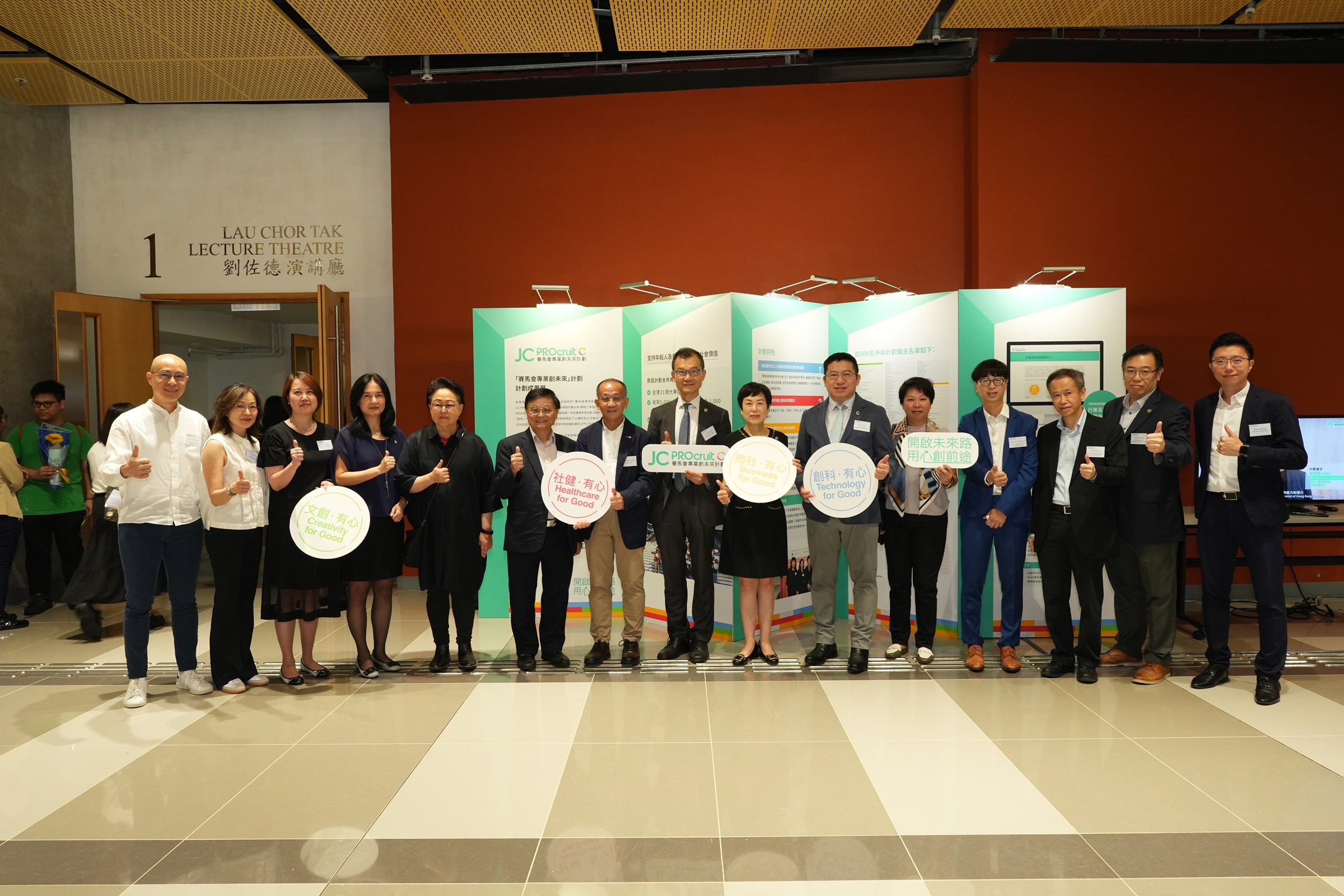 A big applause to a total of 338 trainees who completed the one-year JC PROcruit C Professional Traineeship Programme (Phase 2) and embarked on their new career journeys!
The programme could not have been successful without professional advice and support from HKJC, industry convenors, as well as education and training partners along the journey.
The trainee graduates celebrated their accomplishments together with their employers at the graduation ceremony.
A big applause to a total of 338 trainees who completed the one-year JC PROcruit C Professional Traineeship Programme (Phase 2) and embarked on their new career journeys!
The programme could not have been successful without professional advice and support from HKJC, industry convenors, as well as education and training partners along the journey.
The trainee graduates celebrated their accomplishments together with their employers at the graduation ceremony.Prof. Y. H. Anthony Fung, HKIAPS Director, shared the successful impacts of this programme that had been achieved by June 2024:
|
|
|
Research Centre for Urban and Regional Development
From Vision to Reality: Driving Smart and Sustainable Urban and Regional Development 17–18 May 2024 | LT1, G/F, Esther Lee Building, CUHK |
|
|
Speakers
Prof. Calvin K. L. Chung |
Assistant Professor, Department of Geography and Resource Management, CUHK |
|
Prof. Michael Douglass
|
Emeritus Professor, Department of Urban and Regional Planning University of Hawaii at Manoa, U.S. |
|
Prof. Scarlett T. Jin
|
Assistant Professor, Department of Geography and Resource Management, CUHK |
|
Prof. Mee Kam Ng
|
Associate Director, HKIAPS, CUHK
|
|
Prof. Nicholas Phelps
|
Professor and Chair of Urban Planning in the Melbourne School of Design, The University of Melbourne, Australia |
|
Prof. Zhu Qian
|
Associate Professor, School of Planning, University of Waterloo, UK
|
|
Prof. Jianfa Shen
|
Director, Research Centre for Urban and Regional Development, HKIAPS
|
|
Prof. Ran Tao
|
Presidential Chair Professor and Director Development and Governance division, CUHK Shenzhen |
|
Prof. Dennis Y. Wei
|
Professor, Department of Geography, University of Utah, U.S.
|
|
Prof. Jiang Xu
|
Professor and Department Chairperson, Department of Geography and Resource Management, CUHK |
|
Organizer
Department of Geography and Resource Management, CUHK |
|
|
Co-organizers
Research Centre for Urban and Regional Development, HKIAPS Urban Studies Programme, CUHK |
|
|
Funding Support Faculty of Social Science |
|
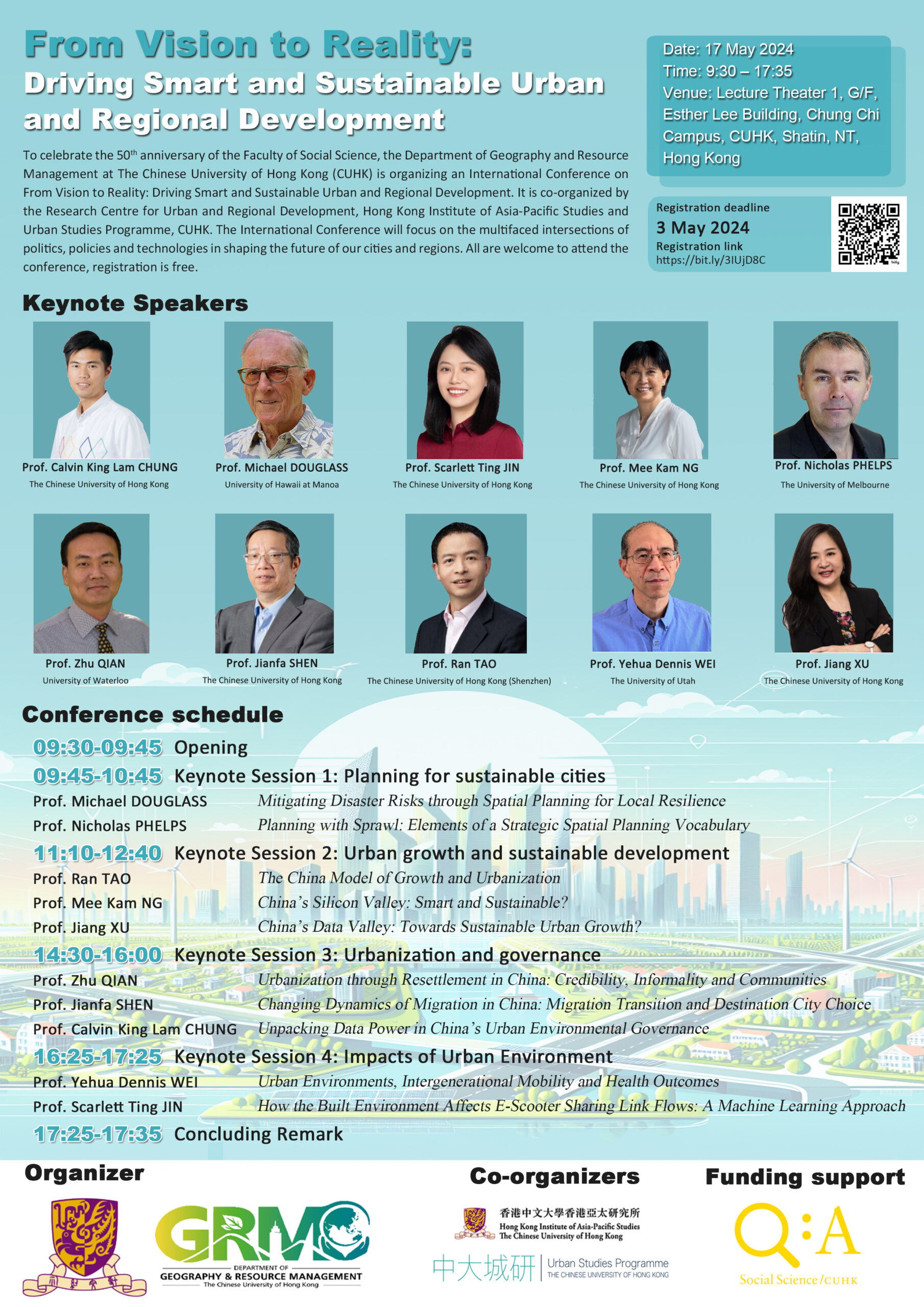 Co-organized by the Department of Geography and Resource Management,
the Research Centre for Urban and Regional Development, the HKIAPS, and the Urban Studies Programme,
this international conference served as a platform for both international and local scholars to explore and discuss the multifaced intersections of politics,
policies, and technologies in shaping the future of our cities and regions.
As we confront the pressing challenges of rapid urbanization, resource depletion, and climate change,
it is imperative that we come together to bridge the gap between visionary aspirations and tangible outcomes in areas such as demographic sustainability, digital governance,
ecological urbanism, healthy city planning, smart transport, social equity and inclusivity, sustainable land management, and urban innovation.
Co-organized by the Department of Geography and Resource Management,
the Research Centre for Urban and Regional Development, the HKIAPS, and the Urban Studies Programme,
this international conference served as a platform for both international and local scholars to explore and discuss the multifaced intersections of politics,
policies, and technologies in shaping the future of our cities and regions.
As we confront the pressing challenges of rapid urbanization, resource depletion, and climate change,
it is imperative that we come together to bridge the gap between visionary aspirations and tangible outcomes in areas such as demographic sustainability, digital governance,
ecological urbanism, healthy city planning, smart transport, social equity and inclusivity, sustainable land management, and urban innovation. |
|
|
Chinese Law Programme
The Narrated Emotions of Femicide Perpetrators in Latin America: A Common Emotional Economy? 16:00–17:30 | 27 May 2024 | Room 422, Sino Building, CUHK |
|
|
Speaker
Dr Martín Hernán Di Marco |
Postdoctoral Fellow, Department of Criminology and Sociology of Law, University of Oslo, Norway |
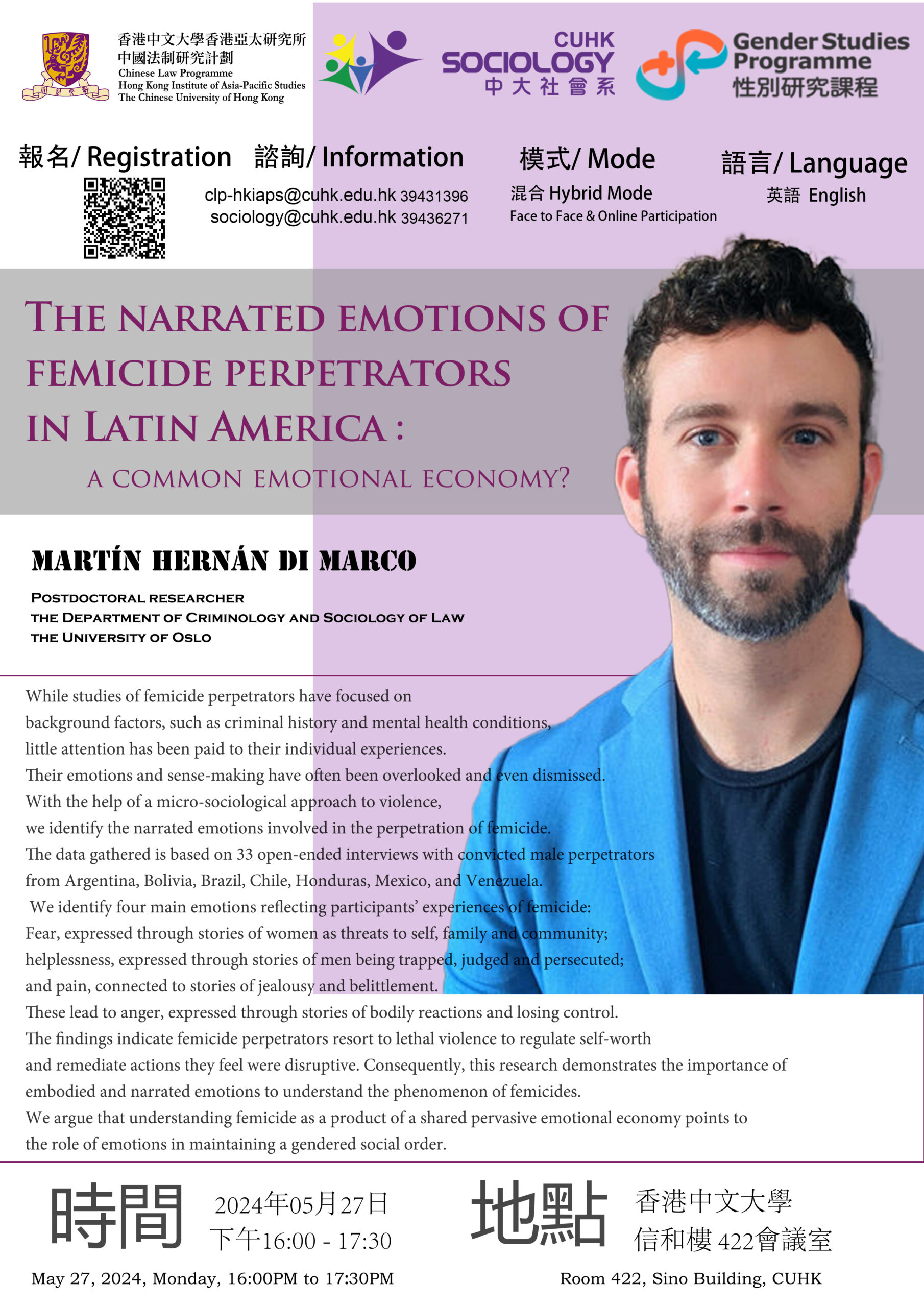 With the help of a micro-sociological approach to violence,
the narrated emotions involved in the perpetration of femicide were identified.
The data that were gathered are based on 33 open-ended interviews with convicted male perpetrators from Argentina,
Bolivia, Brazil, Chile, Honduras, Mexico, and Venezuela.
The findings indicate that femicide perpetrators resort to lethal violence to regulate their self-worth and remediate actions that they felt were disruptive.
Consequently,
this seminar demonstrates that understanding femicide as a product of a shared pervasive emotional economy points to the role of emotions in maintaining a gendered social order.
With the help of a micro-sociological approach to violence,
the narrated emotions involved in the perpetration of femicide were identified.
The data that were gathered are based on 33 open-ended interviews with convicted male perpetrators from Argentina,
Bolivia, Brazil, Chile, Honduras, Mexico, and Venezuela.
The findings indicate that femicide perpetrators resort to lethal violence to regulate their self-worth and remediate actions that they felt were disruptive.
Consequently,
this seminar demonstrates that understanding femicide as a product of a shared pervasive emotional economy points to the role of emotions in maintaining a gendered social order. |
|
|
訪談中國法學傑出學者講座系列:中國證券註冊制改革與依法興市
18:30–20:00 | 20 September 2024 | Cho Yiu Hall, University Administration Building, CUHK |
|
|
Speaker
Prof. Li Guo |
Dean, Peking University Law School |
|
Co-organizer
Office of University General Education, CUHK |
|
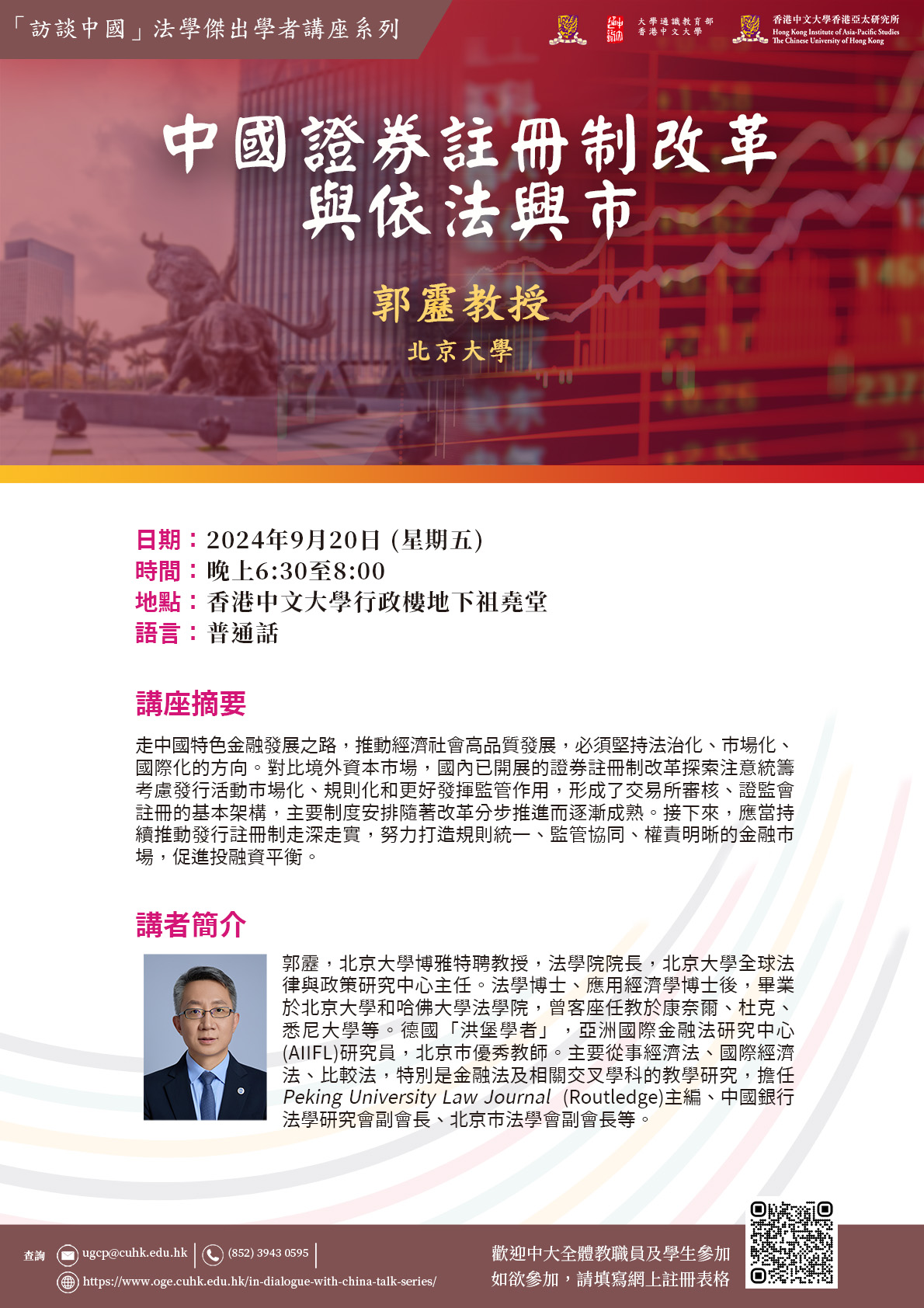 走中國特色金融發展之路,推動經濟社會高品質發展,必須堅持法治化、市場化、國際化的方向。
對比境外資本市場,國內已開展的證券註冊制改革探索注意統籌考慮發行活動市場化、規則化和更好發揮監管作用,
形成了交易所審核、證監會註冊的基本架構,主要制度安排隨著改革分步推進而逐漸成熟。
接下來,應當持續推動發行註冊制走深走實,努力打造規則統一、監管協同、權責明晰的金融市場,促進投融資平衡。
走中國特色金融發展之路,推動經濟社會高品質發展,必須堅持法治化、市場化、國際化的方向。
對比境外資本市場,國內已開展的證券註冊制改革探索注意統籌考慮發行活動市場化、規則化和更好發揮監管作用,
形成了交易所審核、證監會註冊的基本架構,主要制度安排隨著改革分步推進而逐漸成熟。
接下來,應當持續推動發行註冊制走深走實,努力打造規則統一、監管協同、權責明晰的金融市場,促進投融資平衡。 |
|

